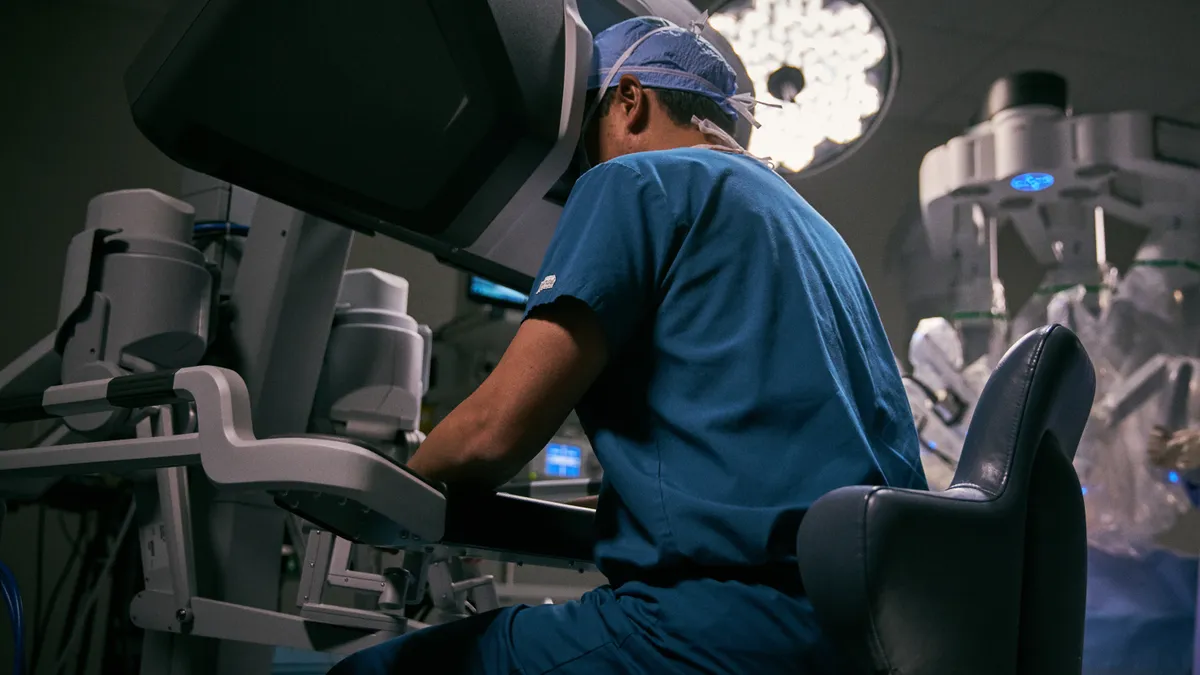Dive Brief:
-
Intuitive Surgical has warned the resurgence of COVID-19 late last year significantly impacted procedures and added to uncertainty about its prospects for 2021.
-
In California, the year-over-year change in da Vinci procedures went from an 8% increase in October to a 6% decline in December. Intuitive cited the California data to illustrate the effect of rising COVID-19 cases in the U.S. and Europe.
- Faced with uncertainty about how long it will take to bring coronavirus cases down and restock diagnostic pipelines, as well as questions about the financial state of pandemic-hit healthcare systems, Intuitive opted against giving guidance for 2021. Baird analyst Mike Polark in a Friday note said the COVID-19 risk seems likely to continue "lingering" in the near term for Intuitive, but he sees potential for improvement over the next few quarters.
Dive Insight:
Intuitive shared key data points on its fourth quarter performance in preliminary results last week. Procedures grew 6%, representing a slowdown from the third quarter but an improvement over the full year. Revenue grew 4% and Intuitive finished 2020 with revenue down 3%, marking its first year of negative growth since 2014.
Stifel analysts said that the fourth-quarter numbers were in line with Intuitive's preliminary results and the lack of 2021 guidance was not a surprise. However, the analysts were still concerned about future COVID-19 uncertainties.
“We are moving our already-below-consensus numbers lower,” the analysts wrote. “We remain cautiously optimistic about the possibility of a stronger-than-projected 2H21 procedure rebound, but for now we await greater clarity on COVID recovery."
Investors seemed concerned too as Intuitive's stock price dropped by nearly 5% when the market opened Friday.
Management provided additional details on the fourth quarter performance and what to expect for the year ahead on a conference call with investors Thursday. Intuitive CEO Gary Guthart identified multiple issues that make it hard to predict how the company will perform in 2021.
The CEO began by discussing the effect of rising COVID-19 cases on hospitals, noting that, while the system is coping better than early in the crisis, the number of coronavirus infections drove "another clamp down on surgeries" in December that continued into January.
Guthart and Intuitive CFO Marshall Mohr named Italy, the U.K., the Nordics and France as parts of Europe where the resurgence of the coronavirus has had "significant impacts on procedures," adding that "constraints on elective surgery have been implemented assertively in Germany." Guthart expects delayed procedures to "impact the growth of surgical departments, pressuring new system installs until excess capacity is consumed."
Diagnostic procedures appear to be slowing in hard-hit regions, Guthart said, and that situation will "likely take several quarters to resolve, even after the threat of COVID begins to abate." It remains unclear how much relief the abatement of the pandemic will bring to Intuitive, with Guthart noting the "budget strain and economic fallout from COVID" may impact spending in countries where the government pays for healthcare.
Baird's Polark in his analyst note pointed to the delay in vaccine rollouts and emergence of new more contagious coronavirus strains as "complicating matters" for patient care amid the resurgence in COVID-19 cases.
"Volumes of certain diagnostic exams also remain under pressure which tends to lead related procedures. These items contribute to ongoing underutilization of [Intuitive's] installed base which, all else constant, influences timing of new system placements," Polark wrote.
Intuitive will need to deal with that confluence of headwinds while holding off a growing number of challengers for the robotic surgery market. Guthart expressed confidence in Intuitive's position in the market. Asked about Johnson & Johnson’s robotic plans, Guthart said "nothing architecturally that I've seen of any of them, including the most recent announcements, has surprised me," adding that Intuitive has trialed a lot of its competitors' ideas internally.
The CEO also addressed the prospect of some rivals bundling products with robotic surgery systems and lowering the price of capital to "see if they can entice folks." Guthart is skeptical the approach will work in the robotic surgery sector.
"Bundling makes sense if the underlying products are commodities, if everybody is selling two ply toilet paper and one brand is not that different than the other, it's all fine. But that's not where we are. Robotic systems and the instrumentation and the imaging systems are not commoditized. And as a result, there'll be strong differences in how they're used and what the outcomes are," Guthart said.












